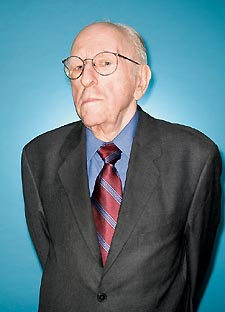Kameny Estate Dispute Leads to Lawsuits
Congressional Cemetery interment for gay rights icon postponed as heir files suit on behalf of estate against four Kameny associates
Plans for a gravesite memorial service for Frank Kameny, a local leader in the national gay civil rights movement who died on Oct. 11, 2011, at the age of 86, have been postponed indefinitely following a legal dispute between longtime associates of Kameny and the heir to his estate, Timothy Lamont Clark.
The service was originally scheduled for March 3, when organizers had planned that half of Kameny’s ashes would be buried at a gravesite at Congressional Cemetery, the remainder going to Clark. But the planned service was postponed roughly a day prior, with Clark, the personal representative of Kameny’s estate, filed four lawsuits shortly thereafter, one each against Marvin Carter, Charles Francis, Richard J. Rosendall and Bob Witeck.

Frank Kameny
Photo by Todd Franson
The lawsuits ask the four defendants to return personal papers that Clark, in his role with the estate, claims belong to the estate and were ”wrongfully taken” by the defendants. The lawsuit against Francis also asks for the return of other items, including an Army uniform, a statue, several ”Gay is Good” pins, personal and historical photographs and a certificate, awarded posthumously to Kameny, from the American Astronomical Society.
In his will, Kameny left Clark his house and his car and named him the estate’s personal representative, and bequeathed his ”personal papers” to the Library of Congress. Prior to Kameny’s death, some of Kameny’s papers had already been preserved through the Kameny Papers Project, the collection of Kameny’s correspondence, papers, and memorabilia related to his work on behalf of the LGBT community for close to 50 years, following his firing by the U.S. Army Map Service because of his homosexuality in 1957.
In 2006, Francis and Witeck had helped Kameny arrange for the Library of Congress to acquire more than 70,000 of his personal documents relating to his work on behalf of LGBT civil rights. Other artifacts, including protest signs Kameny had used in picketing for LGBT rights, were donated to the Smithsonian’s National Museum of American History for an exhibit slated to run from October 2011 through April 2012.
Glen H. Ackerman, whose Ackerman Brown law firm is representing Kameny’s estate and, by extension, Clark, said it is the responsibility of the estate’s personal representative to ensure all items bequeathed to specific individuals or organizations are handed over to the appropriate parties.
”This is a dispute between the estate and individuals who removed property from the home of Dr. Kameny after Dr. Kameny’s death without authority or permission and who have refused to return the property to the estate,” Ackerman said in a statement. ”These individuals are not, and have never been, authorized to act on behalf of the estate.”
Michele Zavos, who served as Kameny’s attorney and filed the probate of the estate for Clark, said she could not comment about the case. While not specifically referencing the Kameny estate, she did explain that, generally, an estate’s personal representative has a fiduciary duty to carry out wishes expressed in the deceased’s will.
Zavos also said that if a personal representative does not carry out the will’s orders, or at least make a significant attempt, a beneficiary could have a claim against the personal representative.
Ackerman said the estate believes the four individuals entered Kameny’s home with a key following his death and removed property, including, but not limited to, papers and artifacts of historical significance, without authority or permission. Ackerman also said that the four have not returned the property to the estate or turned it over to the Library of Congress.
”If these individuals removed papers from the Kameny home because they understood that Dr. Kameny bequeathed his personal papers to the Library of Congress, why haven’t these individuals delivered the papers to the Library of Congress?” Ackerman asked. ”After all, Dr. Kameny died on Oct. 11, 2011. Why did these individuals remove items that aren’t papers? A statue is not a paper. A dog tag is not a paper. A military uniform is not a paper.”
Ackerman also raised the issue of ownership of the plot at D.C.’s Congressional Cemetery, where Kameny’s ashes were to be interred, as well as a stone gravesite marker reading ”Gay Is Good” and a military headstone at the site. Ackerman, speaking on behalf of the estate, says the cemetery plot needs to be transferred to the estate as well.
Ackerman also said that the estate was not aware of the transactions or the plans for the memorial service, saying Clark had been told the ashes had already been buried. He said Clark later learned of the planned memorial service from a press release.
According to Patrick Crowley, director of Congressional Cemetery, the plot, marker and headstone were all purchased or requested by Helping Our Brothers and Sisters (HOBS), an organization dedicated to helping marginalized members of the LGBT community meet short-term needs, which had also helped provide Kameny with financial assistance during his final years.
Crowley noted that each ”purchase” was a separate transaction, though the military headstone is provided free for deceased veterans, which Kameny is. Crowley said the plot where half of Kameny’s ashes were to be buried cost $4,500. According to Ackerman, much of that money was raised by HOBS through personal donations solicited from members of the LGBT community for the purpose of paying for Kameny’s funeral expenses.
Crowley said that the deed to the plot has not been signed by a representative of HOBS, but called that a formality in that the owner of record – in this case, HOBS – makes decisions regarding the gravesite, including who can be buried there and which plaques or tombstones are erected on the gravesite. Crowley said that because HOBS could not resolve its differences with the estate, the gravesite memorial service was canceled, with the estate asking the cemetery not to inter Kameny’s ashes until ownership of the site is resolved.
Crowley told Metro Weekly that the owner of record can simply transfer ownership to another individual or organization, such as the estate, or could transfer the site back to the cemetery, which could then sell the same plot or a different plot to a third party.
”We do it all the time,” Crowley told Metro Weekly about transferring site ownership. He did note, however, it is rare that friends of the deceased buy the plot instead of the estate.
Crowley said HOBS had turned the ashes over to the cemetery, but that the ashes were not interred because the correct paperwork had not been filed. Crowley said the contention that Kameny’s ashes had already been buried was likely a misunderstanding among the various parties.
With specific reference to the plot and Kameny’s remains, Ackerman said the estate had asked HOBS and Carter, the group’s co-founder and president, to transfer the title of the plot to the estate, because the plot can accommodate up to three individuals and the estate is opposed to burying any remains aside from Kameny’s in the plot. Ackerman said that HOBS and Carter refused to transfer the title of the plot to the estate or to the cemetery.
All four – Carter, Francis, Rosendall and Witeck – have declined comment on the estate’s claims. Rande Joiner, the attorney representing Francis, also had no comment.
On the evening of Sunday, March 11, however, Rosendall posted a comment in response to another comment by ”Longtime Reader” following an article in the Washington Blade concerning the lawsuits. Rosendall wrote: ”Longtime Reader, please pay attention. Frank’s express wishes, as stated in his will, included that his papers go to the Library of Congress. The lawsuit was completely unnecessary. As for the interment, I myself had brief remarks prepared for the occasion and was very sorry that the event had to be canceled because of Mr. Ackerman’s insistence that the interment not proceed until the dispute he launched was resolved (about which he has been quite disingenuous). I helped choose Frank’s burial plot and grave markers. The facts show that those of us being sued have acted out of the highest respect for Frank. I worked with Frank for more than 30 years. Incidentally, I haven’t heard anyone suggest that Mr. Clark should not get the portion of the estate that Frank left to him. Of course he should, without it being drained away by legal fees. That we who have worked pro bono to help Frank and preserve his legacy are called thieves is more than false. It is obscene.”
In addition, San Francisco-based blogger Michael Petrelis, a longtime gay-rights and HIV/AIDS activist, raised some questions on his blog in a March 9 post regarding Ackerman and the Blade, which received an exclusive interview with Clark in February. Specifically, Petrelis wrote that Ackerman, who has represented the Blade in other legal matters, may have a conflict of interest because he represents the Velvet Foundation, a nonprofit organization that is currently spearheading the ”Here I Am” campaign, which seeks to establish the National Museum of LGBT History and Culture in D.C.
Petrelis’s blog post pointed to Ackerman’s representation of both the Velvet Foundation and Kameny’s estate, remarking on his blog, ”Curious to know if Ackerman hopes to recover the possessions for the plaintiff and then sell or donate them to the foundation.”
In a March 12 phone interview with Metro Weekly, Petrelis, a former friend of Kameny’s, said a Google search on Ackerman revealed ties to the Velvet Foundation, which might have an interest in collecting documents related to a major gay-rights figure as it seeks to open a national museum focusing on LGBT history.
A search of the Velvet Foundation’s financial records reveals that the foundation listed something called the ”Kameny Project Collection” as an asset on its 2010 IRS 990 tax filing, to which Petrelis linked on his blog. Previously, in 2009, the Velvet Foundation announced it had purchased several artifacts that were not designated for the Smithsonian or the Library of Congress from the Kameny Papers Project, and were adding those artifacts to their permanent collection for the national LGBT museum.
”I’m not a legal scholar, but it just seems to me there’s a conflict of interest between representing the heir to Kameny’s estate and the gay museum …,” Petrelis said. ”Something is not smelling right.”
”This dishonors Frank Kameny’s life and legacy,” Petrelis said of the lawsuits and Ackerman’s alleged conflict of interest.
Petrelis also criticized the Blade‘s initial coverage of the lawsuits for not mentioning Ackerman Brown PLLC’s ties to the paper.
A spokesman for the Velvet Foundation referred Metro Weekly to legal counsel at Ackerman Brown PLLC.
In response, Ackerman issued the following statement via email: ”Ackerman Brown PLLC represents the Estate of Franklin E. Kameny. Attorney J. Max Barger is working with the Personal Representative of the Estate, Timothy Lamont Clark, for the purpose of administering the Estate according to Dr. Kameny’s Last Will and Testament. Dr. Kameny, in his Last Will and Testament, made a specific bequest to the Library of Congress. Dr. Kameny’s bequest states ‘I hereby give and bequeath my personal papers to the LIBRARY OF CONGRESS.’ The Estate notified the Library of Congress of the bequest.”
Ackerman also reiterated that papers and other items had been removed from Kameny’s house ”without authority or permission,” and have not yet been returned to the estate or given to the Library of Congress. He said the estate is legally obligated to carry out Kameny’s last wishes, as expressed in his will.
Ackerman confirmed in the email that his firm represents the Velvet Foundation and Brown Naff Pitts Omnimedia Inc., publisher of the Washington Blade. He also said the newspaper had approached the estate in January asking if Clark would be interested in sharing his story with the LGBT community. In February, Clark agreed to participate in an interview.
A request for comment from Lou Chibbaro, the reporter mentioned by Petrelis, was referred to Blade Editor-in-Chief Kevin Naff, who has not yet responded.
Ackerman also addressed questions of possible conflicts of interests, stating:
”Ackerman Brown’s representation of the Velvet Foundation and of Brown Naff Pitts Omnimedia, Inc. is not in conflict with its representation of the Estate of Franklin E. Kameny. Further, Ackerman Brown does not own or have an ownership interest in either entity. Nor does Ackerman Brown have the power of influence over either entity.
”Further, Ackerman Brown and its principals do not own or have an ownership interest in either entity. Nor does Ackerman Brown and its principals have the power of influence over either entity.”
[Editor’s note: Richard J. Rosendall contributes a bi-weekly, freelance Opinion column to Metro Weekly.]
Support Metro Weekly’s Journalism
These are challenging times for news organizations. And yet it’s crucial we stay active and provide vital resources and information to both our local readers and the world. So won’t you please take a moment and consider supporting Metro Weekly with a membership? For as little as $5 a month, you can help ensure Metro Weekly magazine and MetroWeekly.com remain free, viable resources as we provide the best, most diverse, culturally-resonant LGBTQ coverage in both the D.C. region and around the world. Memberships come with exclusive perks and discounts, your own personal digital delivery of each week’s magazine (and an archive), access to our Member's Lounge when it launches this fall, and exclusive members-only items like Metro Weekly Membership Mugs and Tote Bags! Check out all our membership levels here and please join us today!





















